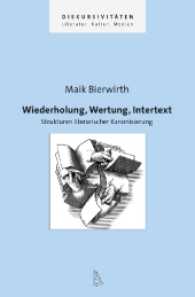- ホーム
- > 洋書
- > 英文書
- > Nature / Ecology
Full Description
This book examines the pressing challenges of urbanization and ecological degradation through the lens of circular economy principles.
The book provides a detailed look at how cities can develop sustainably by integrating new planning strategies that promote economic growth while protecting the environment. Through analysis of Yangling, an agricultural research district within the Xi'an-Xianyang metropolitan area, it offers practical frameworks for resource planning, technological innovation, and strategies for engaging communities and stakeholders in the planning process. This gives readers valuable insights into creating compact, energy-efficient, and land-saving urban areas.
This volume serves as a guide for the transformation of small and medium-sized cities toward healthier, more resilient urban environments that meet the needs of their residents while fostering ecological balance. A valuable resource for urban planners, policymakers, government officials, and scholars interested in sustainable development.
Contents
1 Circular Urban Planning for Sustainable and Resilient Cities 2 Relationship between circular economy and urban planning 3 Circular economy support system 4 Technology platform: The cornerstone of China's circular economy 5 Planning principles of small and medium-sized cities based on circular economy 6 Industrial Ecological Network and Its Evolution Mechanism 7 Regional Differences and Coordination in the Circular Economy 8 Policy Tools for Developing Regional Circular Economy 9 Urban land use planning based on the circular economy 10 Urban water resources planning based on the circular economy 11 Yangling city planning practice based on circular economy 12 Sustainable development mechanism of circular economy in resource-based cities
-

- 文具・雑貨・特選品
- ジュエリー絵画(R) サンリオ 花オト…







